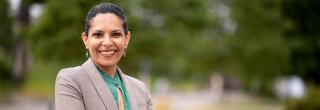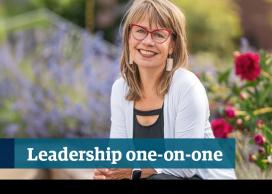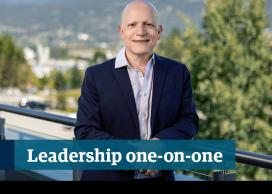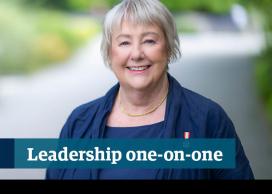Arig al Shaibah is UBC’s Associate Vice-President, Equity and Inclusion. She was appointed to this role in July 2022.
In her current role, Dr. al Shaibah works in partnership with units across both UBC campuses to champion institutional efforts and embed equity, diversity, inclusion into the structure, policies and processes of the university.
Dr. al Shaibah has amassed over 15 years of experience working as a senior administrator in three Canadian research-intensive universities advancing accessibility, inclusion, employment equity, and human rights. Prior to joining UBC, she held various leadership roles at McMaster, Dalhousie, and Queen’s University.
As a racialized Muslim Yemeni-Canadian cisgender woman of Afro-Arab heritage, Dr. al Shaibah brings a global, inclusive and empathic perspective to her efforts at the university. She is inspired by the ‘everyday hero’ and believes that, at its core, equity, diversity, and Inclusion is about changing hearts and minds.
Q1. What quality do you most admire in a leader?
AaS: I’ve learned the value of humility in the work that I do – especially in the realm of equity, diversity, inclusion and social justice. For me, humility is the ability for a leader to demonstrate a careful balance between strength and vulnerability. As leaders, humility is also about our relationship to power – how we yield and wield our influence and how we show compassion and empathy. We must practice this in a productive and meaningful way, all while understanding the limits of our knowledge and acting as continuous learners. I’d love to see humility transcend all paradigms of leadership.
Q2. What makes you laugh?
AaS: I love a good comedic series – one that makes me laugh gutturally. I like dry, smart, critical and intelligent humour that tends to ‘punch up’. The most recent series that made me laugh out loud was Loot with Maya Rudolph from Saturday Night Live.
I also get endless joy from seeing animals find unexpected friends across species – for example, I recently watched a story about a puppy befriending a duckling. Perhaps it’s a metaphor for me and my work in this space of equity and social justice, as I routinely engage with people who are really different from me. Some of the most heartwarming and transformative moments for me have come from finding a deep connection with someone very different from me.
Q3. Who inspires you, and why?
AaS: My wife, Hagar, is not only my biggest support, but also the foundation behind a lot of my consciousness raising.
My parents were raised in Yemen at the time of colonialism, which inevitably impacted the way they navigated the world around them. Needless to say, their influence rubbed off on me in my early years, so as an Arab-Muslim woman (who also happened to be the middle child), I was raised to be rather inconspicuous, yet hospitable ‘no matter what’. Once I met Hagar, she helped me find strength in my voice, understand how to embrace boundary setting, and rejoice in asserting myself in a meaningful way. Furthermore, she also taught me to do this with the comfort of knowing that I can still achieve all of this without losing the ability to be hospitable, kind and diplomatic.
I feel very fortunate to have met her serendipitously 30 years ago. She inspires me every day.
Q4. For you, what makes UBC different?
AaS: As a research-intensive university, UBC is uniquely positioned to contribute to social betterment (environmental and social justice) both locally and globally. Its sheer size really makes it unique in its potential to give back.
What also fascinates me is learning about the unique mix of people who want to be at UBC and who come to live in this part of Canada. I often think about how we can all leverage this uniqueness. It’s a privilege to be part of this community.
Q5. What’s the most important lesson you’ve learned, in your career to date?
AaS: Investing in relationships, leading with ethics of care, and always seeking to understand how the decisions we make impact others, are essential qualities for success and longevity in any leadership role, but especially one focused on equity leadership. I’m always asking myself, “how can we be more compassionate, empathic, and relationship-focused, while making decisions on the organization’s future?”
Q6. How do you like to recharge?
AaS: I’ve always had an active lifestyle, and these days, I enjoy a long steady trot on the treadmill while listening to my workout mix – which is heavily dominated by dance songs from the 80s.
I also get a lot of joy from puzzles – especially logic puzzles! It focuses my mind and allows me to step away from all of the unpacking and debriefing that I do at work. In addition to logic, I also enjoy diving into crosswords and sudoku games – it’s a great escape for me.
Q7. What is the best advice you were ever given?
AaS: “Sometimes you need to know when to zip it.”
Early in my post-secondary career, I had the privilege of sitting down with a senior leader who shared this amusing, yet poignant piece of advice with me (especially as it related to influencing change). Higher education is such a complex environment with so many stakeholders and interests, so I have found it to be useful advice to think strategically about when to speak up and when to sit back and simply be an active listener.
Q8. What do you value in your colleagues?
AaS: I have faculty, staff, and senior administrative colleagues, and I deeply appreciate collegial thoughtfulness and mutual respect for our different contributions – regardless of ‘rank’.
I’ve been very appreciative of all of my colleagues who have been so generous with their time and knowledge as I settle into BC and UBC.
Q9. What do you hope will be your lasting impact at UBC?
AaS: Diversity ‘at the table’ can be transformative. I am a racialized Muslim Yemeni-Canadian cisgender woman of Afro-Arab heritage who is a scholar-practitioner in a senior administrative role. I feel very privileged to be in this space, and as such, I’m frequently trying to skillfully navigate spaces and nudge change as both an “insider and outsider” in the academy. I hope that my presence and equity work is catalytical, and that it parlays into more widespread representation and equity proficiency across uppermost leadership teams to influence change agency across the institution as a whole.
Q10. If you could have a super power, what would it be?
AaS: Wouldn’t teleporting be great?! I’ve got family and friends in different parts of the world and would love to see more of them.
I’m also feeling a pull to learn more about my heritage. With the power to teleport, I’d take my mother back to Yemen to learn more about my family’s roots.
Q11. You have such a breadth and depth of experience, what is one thing you bring to the university that is unique to your experience and your career path?
AaS: I’ve had the privilege of a fairly eclectic educational and career trajectory that has afforded me broad academic and professional experiences, as well as experience in community-based organizations.
I did my undergraduate degree in life sciences, I have a Master’s degree in public administration, and a PhD in Education. Before re-entering higher ed, I spent many years working in the not-for-profit sector, where I honed a lot of my initial skills around consciousness raising, and social justice work. Additionally, I’ve lived, worked, and studied abroad surrounded by a myriad of local citizens and expatriates of diverse backgrounds.
Having been immersed in environments where I’ve been at the edge of my comfort zone, surrounded by a diversity of people and perspectives, I have developed the confidence to walk into any space, knowing that I will be able to adapt – an unintentional, but an important learning path for me that has primed me for the work I’m doing now in higher education.
Q12. What role can we all take in supporting equity, diversity and inclusion at UBC?
AaS: There’s shared responsibility in supporting equity, diversity and inclusion by thinking about, and acting within our own circles of influence. We all have a role in moving the proverbial dial. Rather than waiting for others, we need to embrace our own agency, and consider which ‘levers’ we can pull. A great deal of this work can only happen when we are self-reflexive.
Published: April 17, 2023
Interviewed by: Rivka Parris, UBC Internal Communications



